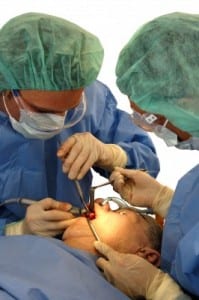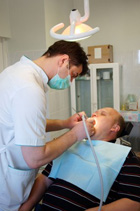 In order to prevent the loss of your natural teeth, it is crucial that you take great care of your gums and avoid periodontal disease. Negligence of your gums may lead to periodontal disease, also known as gingivitis. In severe cases, gingivitis progresses into periodontitis which most certainly leads to tooth loss.
In order to prevent the loss of your natural teeth, it is crucial that you take great care of your gums and avoid periodontal disease. Negligence of your gums may lead to periodontal disease, also known as gingivitis. In severe cases, gingivitis progresses into periodontitis which most certainly leads to tooth loss.
It is important to avoid very sugary and overly processed foods for healthy gums. Smoking and drinking alcohol are harmful to your gums. Certain types of medications may also take a toll on your gums. If you are concerned about the side effects of any regular medication, consult your dentist straight away.
Regular intake of calcium is also important for healthy gums. Calcium cam be obtained from dairy products, salmon, sardines, and green leafy vegetables. Fluoride is also key to keeping your gums healthy. You must brush and floss at least twice a day with fluoride toothpaste containing.
If you need to know more about what foods are great for your gums or what brands of toothpaste are best, please consult your dentist in the City of Leeds. Remember, your dentist is always here to help you with your oral health! A healthy diet, active lifestyle, and great oral hygiene will keep your gums healthy. Visit your dentist regularly and you’ll be sure to avoid periodontal disease.





 How tooth decay can be treated is dependant on how severe the problem of tooth decay is for an individual. Consistent visits to the dentist are vital to catching early signs of tooth decay. Visiting your dentist regularly will help you avoid extensive and costly treatment for extreme cases of tooth decay.
How tooth decay can be treated is dependant on how severe the problem of tooth decay is for an individual. Consistent visits to the dentist are vital to catching early signs of tooth decay. Visiting your dentist regularly will help you avoid extensive and costly treatment for extreme cases of tooth decay. Your missing teeth may be causing you constant discomfort and unbearable embarrassment. Every day tasks of chewing and smiling are challenging and you may be avoiding them altogether. You may also be experiencing difficulty with speech. Fortunately, dentures are offer a great solution for missing teeth.
Your missing teeth may be causing you constant discomfort and unbearable embarrassment. Every day tasks of chewing and smiling are challenging and you may be avoiding them altogether. You may also be experiencing difficulty with speech. Fortunately, dentures are offer a great solution for missing teeth. Do you want to protect your child’s teeth against the problem of tooth decay? Please consider the beneficial procedure of dental sealants. Dental sealants keep germs and food particles out of the grooves of children’s teeth and act as a protective shield for children’s precious teeth. Dental sealants are a great boost to your child’s oral health and are a cost-effective means to prevent tooth decay.
Do you want to protect your child’s teeth against the problem of tooth decay? Please consider the beneficial procedure of dental sealants. Dental sealants keep germs and food particles out of the grooves of children’s teeth and act as a protective shield for children’s precious teeth. Dental sealants are a great boost to your child’s oral health and are a cost-effective means to prevent tooth decay. Dental plaque is a soft bacterial deposit that forms on the surface area of your teeth. It is also referred to as dental biofilm. Some dental plaque can be removed by regular brushing and flossing, but without the added benefits of regular cleanings from your dentist, any dental plaque you missed on your own can harden into calculus, staining your teeth an embarrassing yellow. Calculus cannot be removed without a professional cleaning.
Dental plaque is a soft bacterial deposit that forms on the surface area of your teeth. It is also referred to as dental biofilm. Some dental plaque can be removed by regular brushing and flossing, but without the added benefits of regular cleanings from your dentist, any dental plaque you missed on your own can harden into calculus, staining your teeth an embarrassing yellow. Calculus cannot be removed without a professional cleaning. If you are constantly embarrassed by your bad breath, you may have something called halitosis. Halitosis is often caused by inadequate dental hygiene and other factors such as poor nutrition. Halitosis may also indicate other health problems so you should speak to your dentist in Central Leeds straight away.
If you are constantly embarrassed by your bad breath, you may have something called halitosis. Halitosis is often caused by inadequate dental hygiene and other factors such as poor nutrition. Halitosis may also indicate other health problems so you should speak to your dentist in Central Leeds straight away. If you dream of perfect teeth and are looking for an all-around solution to chipped, stained, poorly-spaced or crooked teeth, consider dental veneers for a confidence boost. Veneers are very thin overlays that create a flawless façade for your teeth. They can be made from different materials ranging from porcelain to a composite resin material. Unlike dentures, veneers are not removable and are cemented to the surface of your natural teeth.
If you dream of perfect teeth and are looking for an all-around solution to chipped, stained, poorly-spaced or crooked teeth, consider dental veneers for a confidence boost. Veneers are very thin overlays that create a flawless façade for your teeth. They can be made from different materials ranging from porcelain to a composite resin material. Unlike dentures, veneers are not removable and are cemented to the surface of your natural teeth. Are you experiencing toothache? Have you noticed any changes in the surface area of your teeth such as a hole or a pit? Then you may have a dental cavity and should see your dentist in the City of Leeds as soon as possible.
Are you experiencing toothache? Have you noticed any changes in the surface area of your teeth such as a hole or a pit? Then you may have a dental cavity and should see your dentist in the City of Leeds as soon as possible. Your dentist in the City of Leeds will be able to diagnose your abscessed tooth with a quick examination with a dental instrument. X-rays may also be needed to determine whether or not the infection has eroded the surrounding bone. With a proper diagnosis, your dentist can begin to treat your abscessed tooth straight away.
Your dentist in the City of Leeds will be able to diagnose your abscessed tooth with a quick examination with a dental instrument. X-rays may also be needed to determine whether or not the infection has eroded the surrounding bone. With a proper diagnosis, your dentist can begin to treat your abscessed tooth straight away. Veneers are a versatile means to correct many dental defects from a chipped tooth to excessive spacing between teeth or discolouration. Rest assured, your dentist in Central Leeds is able to replace veneers more than once.
Veneers are a versatile means to correct many dental defects from a chipped tooth to excessive spacing between teeth or discolouration. Rest assured, your dentist in Central Leeds is able to replace veneers more than once.

